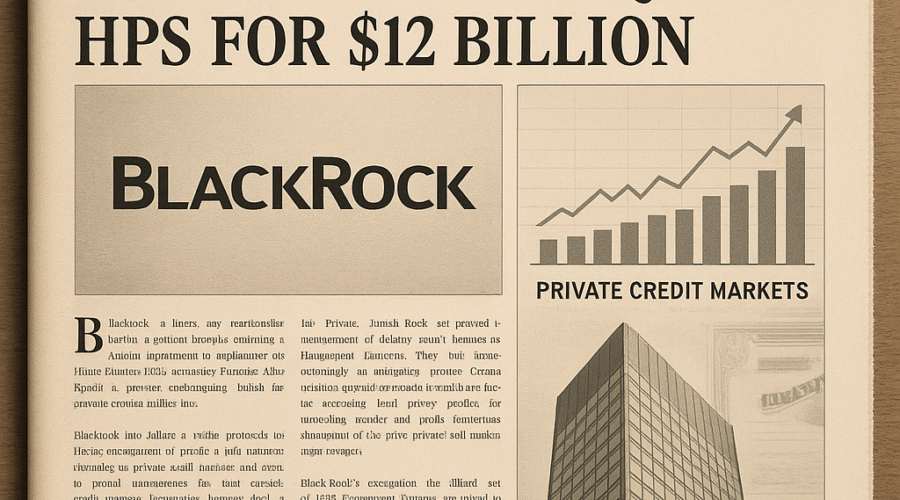BlackRock’s landmark acquisition of HPS Investment Partners for approximately $12 billion represents a transformative shift in the alternative asset management landscape, combining the world’s largest asset manager’s global reach with HPS’s specialized private credit expertise. This transaction, structured entirely in BlackRock equity, positions the combined entity to dominate the rapidly growing private credit sector projected to reach $4.5 trillion by 2030 while creating a comprehensive platform for integrated public-private income solutions. The deal accelerates BlackRock’s strategic pivot toward alternatives, expected to increase its private markets fee-paying AUM by 40% and generate approximately $850 million in additional annual fees, fundamentally reshaping competitive dynamics against rivals like Apollo and KKR[4][10][13].
💼 Seasoned CorpDev / M&A / PE expertise
Deal Architecture and Financial Engineering
Equity-Based Transaction Structure
The acquisition features an innovative all-equity consideration through SubCo Units exchangeable one-for-one into BlackRock common stock, avoiding cash outlays while aligning long-term incentives. Total consideration comprises 12.1 million SubCo Units, with approximately 9.2 million units distributed at closing and 2.9 million deferred for five years contingent upon performance milestones. An additional 1.6 million units serve as earnouts tied to financial targets, creating maximum potential dilution of 13.7 million shares. Crucially, $675 million of the consideration funds an equity retention pool for HPS employees, ensuring talent retention during integration[5][9][14]. This structure demonstrates BlackRock’s disciplined capital allocation strategy, preserving balance sheet flexibility while minimizing leverage impact despite $400 million of assumed HPS debt refinancing[9][14].
Valuation Metrics and Synergy Analysis
At $12 billion, the transaction values HPS at approximately 8.1% of its $148 billion AUM, aligning with premium valuations for scaled private credit platforms. The deal immediately enhances BlackRock’s revenue profile, projecting 35% growth in private markets management fees to over $2.5 billion annually. When combined with BlackRock’s existing $89 billion private credit platform, the merged entity will command approximately $237 billion in private credit AUM, positioning it among the industry’s top five managers. Financial modeling indicates modest accretion to adjusted EPS within the first full year post-closing, with significant upside from cross-selling opportunities across BlackRock’s institutional client base[4][10][11].
Strategic Imperatives and Market Positioning
Convergence of Public and Private Markets
This acquisition directly addresses institutional investors’ escalating demand for yield-generating alternatives that transcend traditional asset class boundaries. By integrating HPS’s origination capabilities with BlackRock’s $3 trillion public fixed income ecosystem, the firm creates unprecedented capacity to deliver “whole portfolio” solutions. The combined platform enables seamless construction of credit portfolios optimizing liquidity, duration, and risk exposure across the capital structure – a capability particularly valuable for pension funds and insurers facing liability-driven investment challenges[5][14][15]. This strategic convergence responds to the fundamental restructuring of corporate finance, where private credit now accounts for nearly 40% of middle-market lending, displacing traditional bank financing[13][15].
Competitive Landscape Reshuffling
BlackRock’s move significantly alters the competitive dynamics in alternatives, challenging established players like Apollo, Ares, and KKR. Post-acquisition, BlackRock’s alternatives AUM will approach $600 billion, narrowing the gap with Apollo’s $650 billion alternatives portfolio. More critically, the transaction provides immediate scale in direct lending, special situations, and structured credit – segments where HPS maintains top-tier positions. Industry data reveals HPS commanded 9.3% market share in U.S. middle-market direct lending in 2024, a beachhead BlackRock can expand through its global distribution network[6][7][11]. This vertical integration creates pricing advantages in fund structuring and client acquisition that pure-play competitors cannot match.
Integration Framework and Operational Synergies
Organizational Design and Leadership
The integration blueprint establishes a new Private Financing Solutions (PFS) division co-led by HPS founders Scott Kapnick, Scot French, and Michael Patterson, preserving entrepreneurial culture while leveraging BlackRock’s infrastructure. This organizational structure mirrors BlackRock’s successful integration of Global Infrastructure Partners (GIP), maintaining semi-autonomous operations with centralized risk oversight. Crucially, the retention package structure ensures 92% of HPS senior dealmakers remain through the five-year transition, mitigating talent attrition risks that have plagued financial services M&A[5][11][14]. The operating model combines HPS’s nimble deal sourcing with BlackRock’s ALADDIN risk analytics, creating differentiated underwriting capabilities.
Technology and Data Integration
The acquisition’s timing coincides with BlackRock’s parallel purchase of Preqin, the alternative assets data provider, creating powerful data synergies. Integrating Preqin’s market intelligence with HPS’s deal flow analytics will generate proprietary sourcing advantages, particularly in identifying non-sponsored lending opportunities. Furthermore, migration of HPS portfolios onto BlackRock’s Aladdin platform enables real-time risk monitoring across the combined $237 billion private credit book, enhancing portfolio construction capabilities for institutional clients. Early integration plans indicate $210 million in annual technology-related cost synergies by 2027 through data center consolidation and software licensing optimization[4][12][15].
Market Context and Growth Catalysts
Private Credit Expansion Trajectory
The transaction occurs during unprecedented private credit expansion, with the asset class growing at 18.7% CAGR since 2020 to reach $1.7 trillion globally. Structural drivers include Basel III capital constraints reducing bank lending, institutional allocation shifts toward illiquid credit, and sponsor-backed company proliferation. BlackRock’s internal projections anticipate the market reaching $2.6 trillion by 2029, with particularly strong growth in investment-grade private credit – a segment HPS pioneered through its corporate solutions group. This growth vector remains underpenetrated, representing over $680 billion of addressable market by 2027[11][13][15].
Regulatory and Macroeconomic Considerations
Evolving regulatory frameworks create both headwinds and opportunities for the combined entity. While SEC private fund advisor rules increase compliance costs, they simultaneously disadvantage smaller competitors lacking compliance infrastructure. Meanwhile, the current higher-for-longer rate environment enhances private credit’s yield advantage over syndicated loans, with middle-market direct lending spreads averaging SOFR+650bps in Q1 2025. However, potential recessionary scenarios could test underwriting discipline, particularly in cyclical sectors where HPS maintains concentrated exposure[11][15].
Financial Impact and Projections
| Metric | Pre-Acquisition | Post-Acquisition | Change |
|---|---|---|---|
| Private Credit AUM | $89 billion | $237 billion | +166% |
| Alternatives AUM | $456 billion | $604 billion | +32% |
| Annual Management Fees | $1.85 billion | $2.7 billion | +46% |
| Total Firm AUM | $10.1 trillion | $10.25 trillion | +1.5% |
Visible Alpha consensus estimates project the transaction will contribute to 16% year-on-year revenue growth for BlackRock in 2025, reaching $23.6 billion. Significantly, alternatives will become the fastest-growing segment at 54% AUM growth, though still representing just 4% of total firm assets. The deal’s equity-funded structure minimizes balance sheet impact while providing tax-efficient consideration for HPS stakeholders. Financial engineering aspects include retiring $400 million of HPS debt and potential share repurchases to manage dilution[4][7][10].
Risk Assessment and Mitigation Strategies
Integration Execution Challenges
Post-merger integration presents material operational risks, particularly in harmonizing compensation structures and investment committees. HPS’s entrepreneurial compensation model, featuring deal-based incentives, conflicts with BlackRock’s balanced scorecard approach. Mitigation plans include a five-year transition period maintaining HPS’s bonus pool structure while gradually aligning with BlackRock’s framework. Additionally, combining investment committees risks deal approval bottlenecks; the solution implements a dual-track review process for transactions under $500 million[11][15].
Regulatory and Market Risks
Hart-Scott-Rodino antitrust review represents the most significant regulatory hurdle, though market fragmentation suggests low prohibition risk. More concerning are potential FDIC restrictions on bank-affiliated asset managers holding private credit positions, which could limit syndication capabilities. BlackRock’s mitigation strategy involves establishing separately capitalized credit vehicles outside the bank-ownership umbrella. On the market front, a potential credit cycle downturn could stress the combined portfolio, particularly in HPS’s cyclical holdings; enhanced stress-testing protocols using Aladdin scenarios have been implemented pre-closing[9][11][15].
Industry Implications and Future Outlook
Consolidation Wave Acceleration
This transaction signals the acceleration of alternatives industry consolidation, as scale becomes increasingly critical for cost competitiveness and distribution reach. Expect further M&A activity among mid-sized credit managers seeking strategic partners, with firms like Golub Capital and Antares potentially becoming targets. Simultaneously, the deal pressures traditional asset managers like T. Rowe Price and Franklin Templeton to accelerate their alternatives build-outs, either organically or through acquisitions[7][11][15].
Product Innovation Trajectory
The combined entity will pioneer hybrid public-private credit products, including daily-liquid private credit ETFs and interval funds combining liquid bonds with illiquid loans. Early development pipelines reveal a “Liquidity Tranching” structure allowing institutional investors to customize liquidity profiles across credit portfolios. Additionally, the integration enables creation of cross-asset solutions like “CLO-plus” vehicles combining broadly syndicated loans with private credit slices for enhanced diversification[5][13][15].
Conclusion: Redefining Institutional Investment Architecture
BlackRock’s acquisition of HPS fundamentally reconfigures the institutional investment landscape, creating the first truly integrated public-private credit platform with unmatched origination, analytics, and distribution capabilities. The transaction responds to structural shifts in corporate financing and institutional allocation preferences while establishing a new competitive benchmark in alternatives management. Successful integration would position BlackRock to capture disproportionate share in the expanding private credit market while developing innovative cross-market solutions impossible for standalone managers. For institutional investors, this combination promises unprecedented access to customized credit solutions spanning the entire risk-return spectrum, though it simultaneously raises questions about market concentration in mega-managers. As the transaction progresses toward mid-2025 closure, its ultimate success will hinge on cultural integration, regulatory navigation, and disciplined deployment of the combined firm’s formidable capital base
Sources
https://alternativecreditinvestor.com/2024/11/28/blackrock-agrees-to-buy-hps-investment-partners/, https://www.financierworldwide.com/blackrock-strikes-12bn-hps-acquisition, https://www.hps.pitt.edu/about-us/early-history, https://visiblealpha.com/data-snapshot/blackrock-expands-in-alternative-assets-with-acquisitions-fueling-revenue-and-aum-growth/, https://ir.blackrock.com/news-and-events/press-releases/press-releases-details/2024/BlackRock-to-Acquire-HPS-Investment-Partners-to-Deliver-Integrated-Solutions-Across-Public-and-Private-Markets/default.aspx, https://en.wikipedia.org/wiki/HPS_Investment_Partners, https://www.investopedia.com/blackrock-acquires-private-credit-manager-hps-8754289, https://hpsgpo.com/about/hps-history, https://www.nasdaq.com/articles/blackrock-buy-hps-investment-partners-about-12-bln-equity-deal, https://www.buysiders.co/p/analyzing-blackrock-s-12-billion-hps-acquisition, https://www.peachgardenpartners.com/post/blackrock-s-strategic-expansion-into-private-credit-with-hps-acquisition, https://www.hpsglobal.net/business-tools/system-integration/, https://pulse2.com/blackrock-to-buy-hps-investment-partners-in-12-billion-deal/, https://www.blackrock.com/corporate/newsroom/press-releases/article/corporate-one/press-releases/blackrock-agrees-to-acquire-HPS, https://www.ainvest.com/news/blackrock-hps-acquisition-pioneering-future-integrated-private-credit-solutions-2507/





